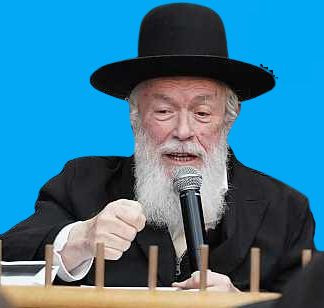
We have been privileged to have the 'pillar of fire' advancing before the camp, i. e. HaRav Dov Lando, who is showing us, during these troubled times, the path we must follow and to what extent we must strengthen ourselves.
He urged us to fortify ourselves in our relations to one another, and also to be more vigilant about the laws of Shabbos which present many pitfalls even in transgressions mide'Orayaso. We must study the prevalent laws regularly, and consult Torah sages regarding their details so that many can benefit therefrom.
I would like to add to our dear brethren that it is undeniably clear that by strengthening ourselves in these laws of Shabbos and studying them in detail, we will bring salvation from all the troubles which surround us during this period.
As Chazal said in Maseches Shabbos (118b): Rabbi Shimon ben Pazi said in the name of Rabbi Yehoshua ben Levi in the name of Bar Kapora: Whoever partakes of three meals on Shabbos is spared from three types of suffering: the trials [preceding the coming] of Moshiach, the suffering of Gehennom and those of the war of Gog and Magog.
We know that the generation during when the son of Dovid is expected to come is preceded with suffering, referred to as 'chevlei,' similar to the pangs preceding birth, chevlei leida.
Before birthing, a women suffers with every contraction, but knows that each one hastens the happy event of the birth itself. We, too, with every form of suffering, at every stage, know that the redemption is nigh and imminent.
Even so, we ask not to have to experience that difficult test. Chazal gave us the possibility of experiencing it in a much lighter form, which is by partaking of three meals on Shabbos, to enhance and honor Shabbos. Chazal promised us that this practice would allow us to avoid those pangs.
Chazal further said (on 119a): Rabbi asked Rabbi Yishmoel ben Rabbi Yossi: By what merit do wealthy Jews living in Eretz Yisroel enjoy riches? He said: Because they give ma'aser! By what merit do Jews in Bovel enjoy wealth since the mitzvah of tithing does not apply to Bovel. He replied that it is because they honor the Torah. He again asked regarding the wealth of Jews in other countries where there are no Torah scholars. He was told that it was in the merit of their honoring Shabbos.
This can be explained thusly: We find in Kiddushin (82b) that Rabbi Shimon ben Elozor said: I never saw a deer drying figs (a trade in those days) or a lion as a porter, a fox a shopkeeper (a profession which requires cunning, like the fox, explains the Maharal), and yet they sustain themselves without much effort. But they were only created to serve me, while I was created to serve my Maker. Does it not stand to reason if those created to serve me are provided with their needs without much effort, that I should also be provided with my needs without effort? But I was wicked and forfeited my livelihood, as is written in Yirmiyohu (5:25): 'Your sins swayed you from the path and your sins prevent the good from you.'
We can conclude that under natural circumstances, a person should be able to meet his needs without trouble at all, in the same manner as animals, but when man sins, he forfeits his livelihood through his sins. However of one who keeps Shabbos and honors it properly. Chazal said (Shabbos 118b): Rabbi Chiya bar Abba said in the name of Rabbi Yochonon: Whoever preserves Shabbos according to its laws, even if he worships idols like in the generation of Enosh — he is forgiven, as is written (Yeshaya 56:2): "Fortunate is the man [Enosh] who does so... keeps Shabbos meichalelo, from desecrating it.' Do not read: meichalelo, but mochul lo, he is forgiven his sins.
The use of 'Enosh' purposely alludes to men in the generation of Enosh which was rife with idolatry. Even if he was idolatrous, his sins are forgiven if he keeps Shabbos properly. And later, 'Rabbi Yochonon says in the name of Rashbi: If only Yisroel were to keep two Shabbosim according to the Halocho, they would be redeemed immediately because all of their sins would be forgiven and they would experience the Ultimate Geula.
Therefore, if one keeps Shabbos properly, his sins are forgiven and he returns to his natural state in which his needs are met without much effort, and thus the rich people in Bovel merit their riches because they keep Shabbos and honor it.




